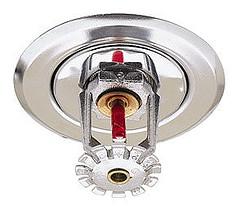The Florida Department of Business and Professional Regulation (DBPR) has announced that ALL residential condominiums in the state of Florida must install fire sprinkler systems, unless they vote to opt-out of this requirement by the end of 2016.
According to an article published in the Palm Beach Post on Friday, July 8, 2016, quoting Travis Keels, Deputy Director of Communications for the DBPR, “generally speaking, the fire sprinkler requirement applies to all residential condominiums.”
The statutory provisions dealing with the fire sprinkler system retrofitting requirements for a condominium association and the procedures for waiving a fire sprinkler system retrofitting are as set forth in Florida Statute 718.112(2)(l). The statute states that while no state or local authority may require the completion of a fire sprinkler system retrofitting before January 1, 2020, a condominium association must (where required by local code/ordinance) have initiated (by December 31, 2016) a building permit for the required fire sprinkler system retrofitting with local government, demonstrating that the association will have completed the fire sprinkler system retrofitting by December 31, 2019.
A condominium association does, however, under this statute, have the right to waive the retrofitting of condominium buildings with a fire sprinkler system, if such waiver is approved by the Association members by the end of 2016.
 When initially passed into law in 2003, retrofitting was only required for condominium buildings more than 75 feet in height. The law was changed later to, among other things, to remove such requirement, leaving confusion as to applicability. The question as to whether a condominium association would be required to retrofit the condominium buildings with a fire sprinkler/life safety system was dependent on local codes and ordinances in place in the city and/or county where the condominium is located. That would, to some extent, depend on the exact size and structure of the Association’s buildings, and it was generally recommended that the Association retain a consulting engineer, consulting general contractor, or a fire safety systems expert that could advise as to the obligation to install such a system under city/county or other codes or ordinances.
When initially passed into law in 2003, retrofitting was only required for condominium buildings more than 75 feet in height. The law was changed later to, among other things, to remove such requirement, leaving confusion as to applicability. The question as to whether a condominium association would be required to retrofit the condominium buildings with a fire sprinkler/life safety system was dependent on local codes and ordinances in place in the city and/or county where the condominium is located. That would, to some extent, depend on the exact size and structure of the Association’s buildings, and it was generally recommended that the Association retain a consulting engineer, consulting general contractor, or a fire safety systems expert that could advise as to the obligation to install such a system under city/county or other codes or ordinances.
However, due to the recent change in law, the determination by the DBPR, and the resulting confusion and/or differences of opinion among local fire marshals and code requirements, Clayton & McCulloh must advise all of our condominium clients that they must comply with the law as it is being interpreted by DBPR. Accordingly condominium clients should waive the installation of a fire sprinkler system or be prepared to install same. This is regardless of whether the codes and ordinances in place in your jurisdiction actually require such vote or retrofitting.
There are a number of steps involved with such a vote. Due to the specific statutory requirements set forth in Florida Statute 718.112(2)(l), it is strongly recommended that the documentation and procedures involved in proceeding with the proposed waiver of a fire sprinkler system retrofitting for the Association be conducted in conjunction with, and under the auspices of, the Association’s legal counsel.
Please do not hesitate to contact Clayton & McCulloh should you have any additional questions regarding these issues.

